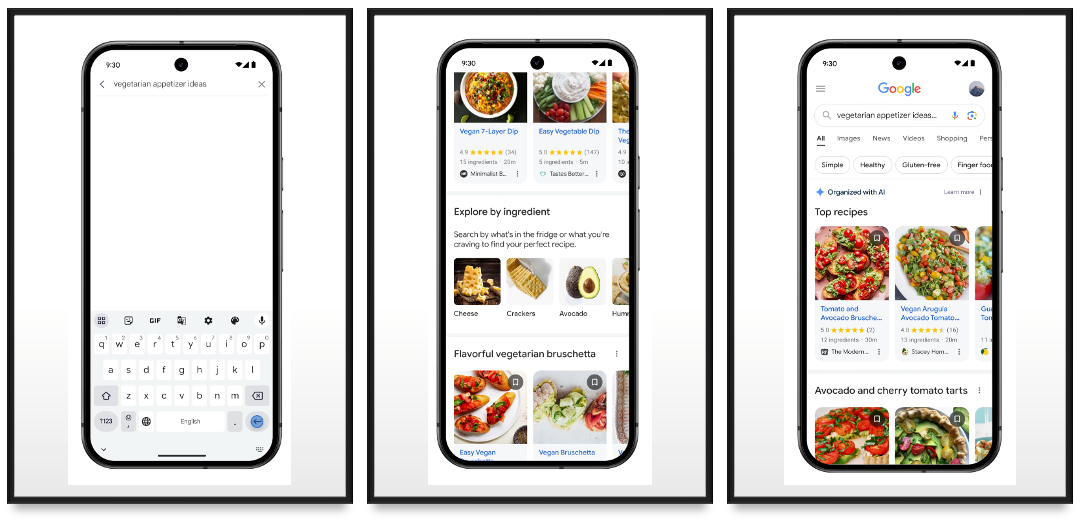Google AIPs Go Live, FTC Goes After AI, AI Buying Assist

AI Organized Pages Go Live
At Google I/O earlier this year Google Head of Search Liz Reid teased "AI Organized Pages," which as the name suggests use AI to organize an entire page of search results, not just an overview at the top. That feature is rolling out today in the US, with recipes first, according to a new blog post. It will expand later to restaurants, entertainment, travel, shopping and other categories. It's not clear how different these pages will be from one another. However, it represents a potentially significant (even radical) change in the way the SERP appears and the order of particular features and modules. Google says this will create a better user experience and make content more discoverable. This is Google's boldest response to date to the challenge of AI and "chatbots." Reid's blog post suggests that some of these results may be personalized: "You’ll now see a full-page experience, with relevant results organized just for you." In addition to AIOPs (AIPs if you prefer), there were several other announcements. Google Lens will now support video-based search queries; Lens shopping results will be more detailed; a new AIO design with more prominent links, and ads will now officially appear in AIOs.

Our take:
- As we previously discussed on one of our podcasts around Google I/O, the company could have done a version of this (by vertical) without AI.
- We'll have to see what these pages look like and how they perform: engagement, clicks, traffic. Reid says beta tester response has been positive.
- There's some evidence of usage erosion at the margins (social and AI). This is part of a larger effort to stop/preempt that, while not impacting ad revenue.
FTC: AI Writing Tool = Fake Reviews
Rytr is an AI writing tool, much like many others on the market. Among other uses, Rytr can create "testimonials and reviews." The FTC filed a complaint against Rytr, in conjunction with other enforcement actions against several companies "that use AI hype or sell AI technology that can be used in deceptive and unfair ways." The vote was 3-2 on whether to charge Ryter, with Republican Commissioners Andrew N. Ferguson and Melissa Holyoak dissenting. The FTC argues that Rytr can be, and likely has been, used to generate fake or deceptive reviews. "As the service can quickly generate an unlimited number of detailed and genuine-sounding reviews ... its likely only use is to facilitate subscribers posting fake reviews," the complaint reads. The FTC is especially concerned about how the tool facilitates review generation at scale. It says that since 2021, "24 subscribers have generated over 10,000 reviews each, 114 subscribers have generated over 1,000 reviews each, and 630 subscribers have generated over 100 reviews each." This will cause "or is likely to cause" substantial consumer harm. The FTC is seeking a ban on Ryter's review/testimonial generation. The dissent argues the agency is penalizing Ryter for a hypothetical use case without evidence of harm. It also warns about "deleterious consequences for AI products generally."

Our take:
- The complaint does contain examples suggesting the tool has been abused. But the dissent argues there's no specific evidence of actual harm.
- The danger is that existing fraudsters and review farms will supercharge their schemes with AI. Lots of AI tools can be used for "consumer deception." Does that mean they should be punished?
- If Rytr hadn't advertised "testimonials and reviews" as a use case would the FTC have gone after it? We see what the FTC is doing but it's problematic.
Consumers Using AI for Buying Research
Consumers appear to be turning, at least sometimes, to AI to help with buying decisions. That's according to a report from New Street Research, based on a survey of 263 US adults. (The report itself isn't available, so this is based on Mediapost's coverage.) The survey appears to focus primarily or exclusively on mobile users. The significant finding is that roughly 59% of respondents had used AI in the past month "to help research or decide on a purchase." This was more typical of men than women. The survey also asked questions about search usage and found Google to be dominant, as one might expect, although DuckDuckGo and Yahoo came in ahead of Bing. Among "chatbots," ChatGPT was most widely used (48%), then Meta AI (45%), Snapchat My AI (35%) and Gemini (30%). Bing didn't register for mobile users. The findings around Meta and Snapchat My AI usage are somewhat surprising. Tinuiti previously published findings from a survey asking about comparative search and AI usage. It found there was a correlation between heavier ChatGPT/Perplexity usage and reduced reliance on traditional search.

Our take:
- The New Street sample is too small to be meaningful, although the key finding about pre-purchase research is provocative and directionally interesting.
- The majority of search queries are "informational." This is where Google is most vulnerable to "AI substitution."
- It's clear that AI usage is growing, including for traditional search use cases, but so far that hasn't impacted Google in any discernible way.
Recent Analysis
- Hawk Tuah Academy Goes Global on Google Maps, by Mike Blumenthal.
- Near Memo episode 176: Search tactics for EU hotels, Google’s updated spam guideline, when might Yelp v Google go to trial?
Short Takes
- More on how Google outsources indexing, rendering to users.
- Yelp report shows home services industry is booming.
- Lawyers sue over firm names being used as ad keywords.
- New Google GBP review edit and delete buttons.
- Google's Amazon-like e-commerce pages have SEO implications.
- Amazon introduces new visual search features, including circle to search.
- Why SEO may not be the key to optimizing for generative AI results.
- TikTok search ads, so far, aren't stealing budgets from Google ads.
- Any image Ray Ban Meta glasses could be used for AI training.
- Following $500M Spain antitrust fine, 10K hotels may sue Booking.com.
- Fidelity says Twitter now worth only $9B, vs $44B when Musk bought it.
- iOS 18 privacy feature could kill social apps' growth tool (NYT).
Listen to our latest podcast.

How can we make this better? Email us with suggestions and recommendations.

